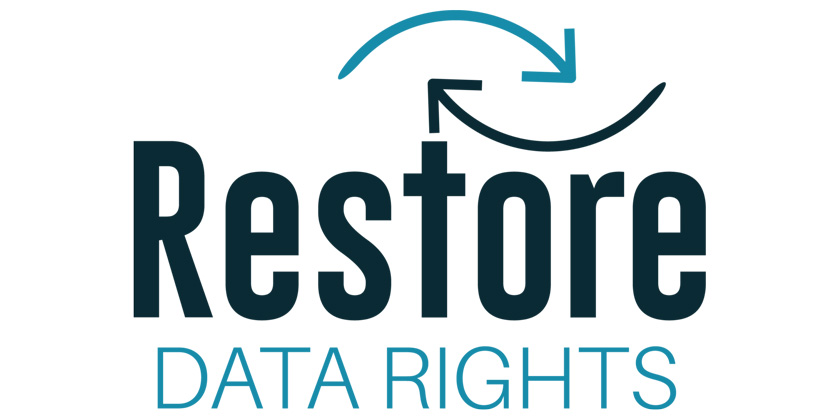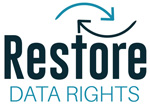The #RestoreDataRights Declaration:
A movement for transparent, accountable and inclusive COVID-19 data use in Africa
The #RestoreDataRights movement is a grassroots initiative supported by a core group of African and international civil society, academic and philanthropic partners – Paradigm Initiative, Africa Digital Rights Hub, Tom Moultrie (Professor of Demography, University of Cape Town), CIPESA, Open Institute and Amnesty International Kenya.
What unites us is a passion and desire to ensure that our fundamental human rights – including those exercised in cyberspace and over our personal and sensitive data – are respected and upheld during, and after, the COVID-19 public health emergency.
Join our movement, sign this declaration, answer our Call to Action and use your voice to ensure that the COVID-19 pandemic is overcome in ways that uphold our fundamental human rights. Sign the Declaration
The #RestoreDataRights movement:
Recognises that the COVID-19 pandemic is an unforeseen global crisis that presents unique and myriad public health, economic, social, security and rights-related challenges for governments, societies, families and individuals around the world;
Further recognises that in certain circumstances and under the right conditions, African governments have the legitimate right to temporarily, legally and proportionately restrict some fundamental freedoms – including freedom of assembly and the right to privacy (including over one’s personal data) – in the interests of public health in order to save lives;
Acknowledges that digital data-driven technologies are now a fundamental part of many, if not all, African nations’ national infrastructure and that digitally-derived data has a legitimate and important role to play in informing policy-makers’ responses to the COVID-19 pandemic in Africa;
Is mindful that while digital tools offer great opportunities for tackling the COVID-19 pandemic, they also come with great risks and potential for harm attached, and therefore must be used responsibly and cautiously by all;
Is aware that there are numerous efforts being undertaken in good faith across the African continent between governments, private sector actors, civil society representatives, regional bodies including the African Union (AU), and development partners including the United Nations (UN), to leverage the potential of digital data-driven technologies to tackle the COVID-19 crisis;
Welcomes initiatives that strive to use data in ways that are lawful, accountable, transparent, safe and inclusive;
Is concerned that in many countries there are still inadequate safeguards, a lack of transparency and accountability, and limited inclusion of citizens and affected people around how sensitive data are being used to tackle the pandemic;
Is alarmed by reports from a number of African countries about allegations of excessively violent – and sometimes lethal – state force being used against civilians to ‘enforce’ COVID-19 related curfews, lockdowns and other socio-economic and public-health measures;
Is concerned that in the context of such allegations of violence that sensitive data that was initially collected for public health purposes may be shared with police or military forces and used to expand surveillance over populations for purposes other than those relating to the pandemic;
Is further concerned at reports of unscrupulous criminals exploiting the pandemic in order to defraud people or steal their digital identities and urges African governments to do all within their power to issue clear guidance and educational materials to help citizens educate themselves about the risks and steps they can take to reduce risk;
Recalls and emphasises the responsibility of countries to respect, protect and fulfil the human rights of all people including the right to privacy exercised over personal data, and human rights – including access to information and freedom of expression – exercised in cyberspace as established in Africa through the African Union Convention on Cyber Security and Personal Data Protection and other instruments;
Further recalls and emphasises the need for country representatives to uphold international data governance and data management standards emanating from both regional and international law, as well as well-established normative frameworks.
Guiding Principles
We believe that decisions, and decision-making processes, taken around how sensitive data are collected, shared and used to tackle the COVID-19 pandemic in Africa should be transparent, inclusive and accountable.
1.‘Transparent’ means:
- Aggregated data and metadata are open to the public
- Open source software and algorithms are used to analyse data
- Information on what entities are collecting data, from what communities and for what purposes are made available to the public
- Data sharing agreements and related documents are openly published
- Data ‘suppliers’ and other private sector actors are procured through open and competitive tender processes
- Government COVID-19 related data strategies and plans are made publicly available
- Details of intra-governmental data sharing are made openly available and are subject to parliamentary, judicial and public scrutiny
2. ‘Inclusive’ means:
- Decisions made around how COVID-19 data are used are taken through established democratic processes
- The public is consulted on how sensitive data (e.g. location data derived from mobile phones) are shared and used to tackle COVID-19, and their responses are used to inform policy interventions
- Any public-private data partnerships that are established to share and use COVID-19 related data should also include representatives from civil society and digital rights groups
- The needs of vulnerable groups are taken into account and steps to protect ‘sensitive group data’ are included alongside actions to protect individuals’ data
3.‘Accountable’ means:
- Appropriate steps are taken to protect data that could, either alone or when combined with other data, result in the identification of individuals or vulnerable groups within datasets used to tackle COVID-19
- Data collected for epidemiological purposes shall not be shared or used by other parts of government, such as police forces or Ministries of Interior
- Protocols shall be established to respond to potential data breaches of datasets containing sensitive data
- Individuals or vulnerable groups who may be harmed by the misuse of their data in response to the COVID-19 pandemic – either intentionally or accidentally – shall have access to judicial redress and due process
- Governments and public bodies shall retain all intellectual property rights over databases and all derivative data outputs produced using African citizens’ data as part of the COVID-19 response
- Governments, private companies and other entities shall commit to engaging with civil society organisations and digital rights defenders in order to identify responsible and practicable ways of winding-down any emergency data collection, processing and use at the end of the pandemic, in accordance with local laws and in line with international best practices
Call to Action
African citizens, civil society, academia and allies
- Sign this Declaration
- Write to your political representatives asking them to endorse the Declaration
- Engage in a pan-African conversation on Twitter using the #RestoreDataRights hashtag
- Contact us if you have concerns about how a private company or your government is using COVID-19 related data
African governments
- Endorse this Declaration
- Engage meaningfully with civil society organisations and digital rights defenders to develop country roadmaps documenting concrete steps to ensure that COVID-19 related data use is transparent, inclusive and accountable
- Complete an audit of processes employed during the ongoing pandemic to ensure compliance with the Principles of this Declaration
- Establish independent oversight bodies (composed of cross-party representatives from the executive, legislature and civil society) to monitor and ensure adherence to local and international law, guiding principles and standards
The AU, UN, and international development partners (public and private)
- Endorse this Declaration
- Support outreach and engagement activities with African countries, regional and international organisations
- Develop organisation-specific roadmaps to ensure that any COVID-19 related data use undertaken by international organisations, including UN agencies, in Africa is transparent, inclusive and accountable
Development donors and funders
- Endorse this Declaration
- Support outreach and engagement activities with African countries, regional and international organisations
- Engage in conversations with grantees and funding recipients to encourage them to endorse this Declaration and develop their own roadmaps as appropriate
- Commit to actively engaging with civil society organisations and digital rights defenders to amplify concerns and recommendations, and supporting the push to #RestoreDataRights in Africa

